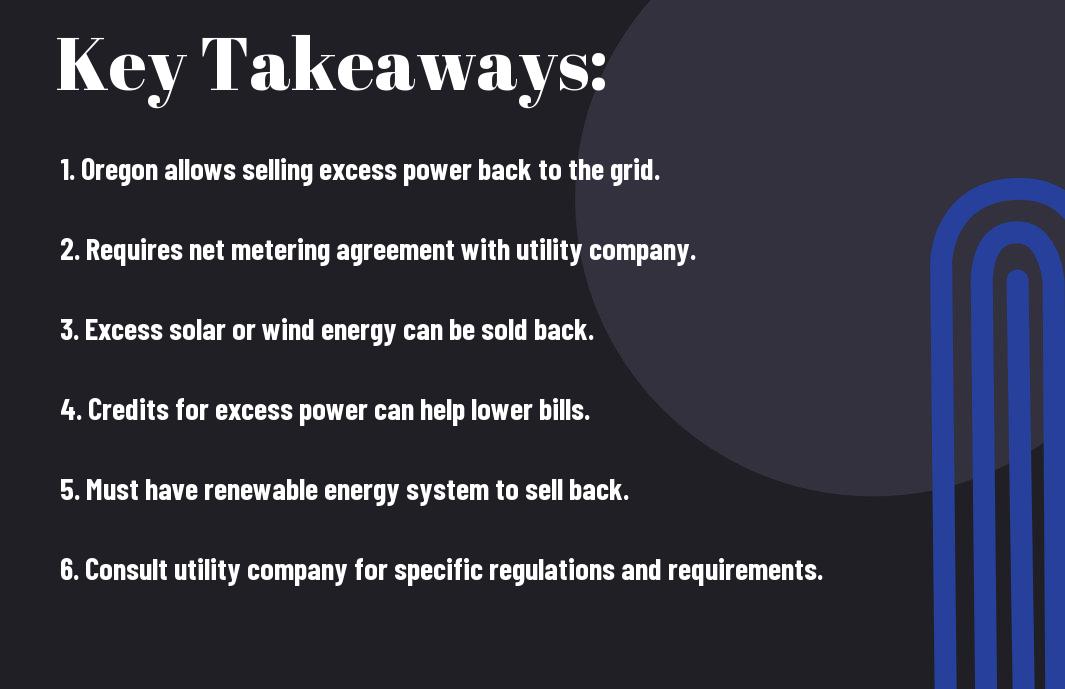Many Oregon residents wonder if they have the opportunity to sell excess power back to the grid. If you are considering renewable energy sources like solar panels, understanding the regulations around selling power back to the grid in Oregon is crucial. In this blog post, we will research into the process and requirements for selling power back to the grid in the state of Oregon.
Key Takeaways:
- Net Metering Program: Oregon offers a net metering program where residents with solar panels or other renewable energy systems can sell excess power back to the grid.
- Eligibility Requirements: To participate in the net metering program in Oregon, homeowners must meet certain requirements, such as having a renewable energy system that meets state regulations.
- Financial Benefits: Selling power back to the grid can help homeowners offset their energy costs and even earn credits on their electricity bills, making renewable energy investment more financially viable.

Oregon’s Net Metering Policy
What is Net Metering?
The Net Metering policy allows you to connect your renewable energy system, such as solar panels, to the grid. When your system generates more power than you need, the excess electricity is sent back to the grid, and you receive credits for it on your utility bill. This helps offset the costs of the electricity you draw from the grid when your system is not producing enough power.
How Does it Work in Oregon?
The Net Metering policy in Oregon allows you to receive full retail credit for the excess electricity your system generates. This means that for every kilowatt-hour of surplus energy you send back to the grid, you receive a credit equal to what you would pay for the same amount of electricity. These credits can be used to offset your future electricity bills when your system is not producing enough power.
Work with your utility company to ensure that your renewable energy system meets the requirements for net metering in Oregon. They will install a special meter that can track the energy flow in both directions, allowing you to accurately receive credit for the surplus electricity you generate.

Eligibility and Requirements
Who is Eligible to Sell Power Back to the Grid?
Little is known about who is eligible to sell power back to the grid in Oregon. Typically, residential homeowners, commercial property owners, and industrial facilities with renewable energy systems, such as solar panels or wind turbines, installed on their properties can participate in net metering programs.
System Size and Installation Requirements
Grid-connected systems that are eligible for selling power back to the grid in Oregon must meet certain size and installation requirements. These requirements vary depending on the utility company and the specific net metering program. It is important to consult with your utility provider or a qualified installer to ensure that your renewable energy system meets the necessary criteria.
Plus, the Oregon Department of Energy offers resources and guidelines to help property owners navigate the process of installing renewable energy systems and connecting them to the grid. By following these guidelines, you can ensure that your system is compliant with state regulations and eligible for selling power back to the grid.
Interconnection Standards
Installation of renewable energy systems must adhere to interconnection standards set by the utility company and the Oregon Public Utility Commission. These standards ensure the safe and efficient integration of renewable energy systems with the existing grid infrastructure. It is crucial to understand and comply with these standards to participate in net metering programs and sell power back to the grid.
Sell power back to the grid in Oregon after meeting the interconnection standards. These standards outline the technical requirements for connecting your renewable energy system to the grid, including safety measures, equipment specifications, and testing procedures. By following these standards, you can ensure that your system is properly integrated and able to sell excess power back to the grid.
Benefits of Selling Power Back to the Grid
Reducing Your Energy Bills
Benefits of selling power back to the grid in Oregon include the opportunity to participate in the state’s net metering program. Oregon Net Metering allows you to earn credits for the excess electricity your solar panels generate. These credits can significantly reduce your energy bills by offsetting the cost of the electricity you consume from the grid.
Generating Revenue
Reducing your energy bills is just one way selling power back to the grid can benefit you. Another advantage is the potential to generate revenue through net metering. By selling the excess electricity your solar panels produce, you can earn additional income, turning your solar investment into a profitable endeavor.
Generating revenue through net metering not only helps offset the initial cost of installing solar panels but also provides a steady stream of passive income for you over time. This additional revenue can make a significant difference in your financial stability while helping to promote sustainable energy practices in your community.
Environmental Benefits
Reducing your carbon footprint and contributing to a cleaner environment are necessary benefits of selling power back to the grid in Oregon. By generating clean, renewable energy through your solar panels, you not only reduce your reliance on fossil fuels but also help combat climate change by lowering harmful emissions.
Beyond the financial savings and potential revenue, knowing that you are actively contributing to a more sustainable future can provide a sense of fulfillment and pride. Your decision to sell power back to the grid in Oregon is not only beneficial for you but also for the planet and future generations.

Types of Renewable Energy Systems
For a better understanding of the types of renewable energy systems available in Oregon, let’s break them down into solar power systems, wind power systems, and hydroelectric power systems.
Solar Power Systems
On the topic of solar power systems, these setups harness sunlight to generate electricity for your home. By installing solar panels on your property, you can capture the sun’s energy and convert it into usable power. Knowing the amount of sunlight your location receives is crucial in determining the efficiency of your solar power system.
Wind Power Systems
An alternative to solar power systems is wind power systems, which utilize the wind to produce electricity. Wind turbines can be installed on your property to capture the kinetic energy of the wind and convert it into electrical power. Recall, the feasibility of a wind power system depends on the average wind speeds in your area.
Renewable energy sources like wind power systems offer a sustainable solution to power your home while reducing your carbon footprint.
Hydroelectric Power Systems
Power generated from water sources through hydroelectric power systems is another renewable energy option. By utilizing the flow of water in rivers or streams, hydroelectric systems generate electricity that can power your home. This method is especially effective for properties located near water bodies.
This type of renewable energy system can provide a constant and reliable source of electricity, making it a popular choice for homeowners looking to reduce their reliance on traditional power grids.
The Selling Process
Once again, selling power back to the grid in Oregon involves a specific process that you need to follow. This process includes metering and monitoring your energy production, understanding how to sell excess energy to the grid, and knowing the payment structures and rates set by utility companies.
Metering and Monitoring Your Energy Production
With metering and monitoring, you can track the amount of energy your solar panels or other renewable energy systems are producing. This information is crucial as it helps you determine how much excess energy you can potentially sell back to the grid.
How to Sell Excess Energy to the Grid
Monitoring your energy production allows you to identify periods when your system generates more power than you consume. During these times, you can sell the excess energy back to the grid. Most utility companies in Oregon have programs in place to facilitate this process.
Understanding how to sell excess energy to the grid involves contacting your utility company to learn about their net metering or feed-in tariff programs. These programs enable you to receive credit or payment for the excess energy you contribute to the grid.
Payment Structures and Rates
Process of selling excess energy back to the grid includes understanding the payment structures and rates that utility companies offer. These structures can vary and may include credits on your bill or direct payments for the excess energy you produce.
Production-based incentives are also common, where you are compensated based on the amount of energy your system produces. Familiarize yourself with the payment structures and rates in Oregon to make the most of selling power back to the grid.
Incentives and Rebates
Despite the initial cost of setting up a system to sell power back to the grid in Oregon, there are several incentives and rebates available to help offset some of the expenses.
Federal and State Tax Credits
Any individual who installs a solar power system in Oregon is eligible for federal tax credits, which can cover up to 26% of the total system cost. In addition to federal incentives, the state of Oregon offers its own tax credits, making it even more affordable to generate your own electricity and sell it back to the grid.
Oregon State Incentives
Federal tax credits are not the only incentives available to Oregon residents. The state also offers cash incentives and grants to homeowners and businesses who invest in renewable energy systems. These incentives can significantly lower the overall cost of installation and help you start earning money by selling power back to the grid sooner.
Furthermore, the Oregon Department of Energy provides technical assistance and resources to help you navigate the incentives and rebates available, making it easier for you to take advantage of these programs.
Utility Company Rebates
Utility companies in Oregon often offer rebates to customers who install renewable energy systems. These rebates can further reduce the upfront costs of setting up a system to sell power back to the grid. By taking advantage of utility company rebates, you can make your investment more cost-effective and profitable in the long run.
Utility company rebates vary depending on the utility provider and the type of system you install. It’s vital to research the rebates offered by your specific utility company to maximize your savings and ensure you get the most out of selling power back to the grid.
Final Words
Conclusively, selling power back to the grid in Oregon can be a beneficial way to offset your electricity costs and contribute to renewable energy generation. By installing solar panels or other renewable energy systems on your property, you can potentially earn credits or payments for the excess power you generate. It’s important to research and comply with the regulations and requirements set forth by your local utility company and the state of Oregon to take advantage of this opportunity.
Q: Can you sell power back to the grid in Oregon?
A: Yes, Oregon has a net metering program that allows residential and commercial customers with renewable energy systems to sell excess power back to the grid. This program provides credits on your utility bill for the excess electricity you generate.
Q: What are the requirements to sell power back to the grid in Oregon?
A: To participate in the net metering program in Oregon, you must have a renewable energy system, such as solar panels or wind turbines, installed on your property. The system must meet certain technical and safety standards set by the utility company. You will also need to sign an agreement with your utility company to sell excess power back to the grid.
Q: How much money can you make by selling power back to the grid in Oregon?
A: The amount of money you can make by selling power back to the grid in Oregon depends on the size of your renewable energy system, the amount of excess electricity you generate, and the current electricity rates. Typically, you will receive credits on your utility bill for the excess power you produce, which can help offset your electricity costs or even result in a profit if you generate more power than you consume.
